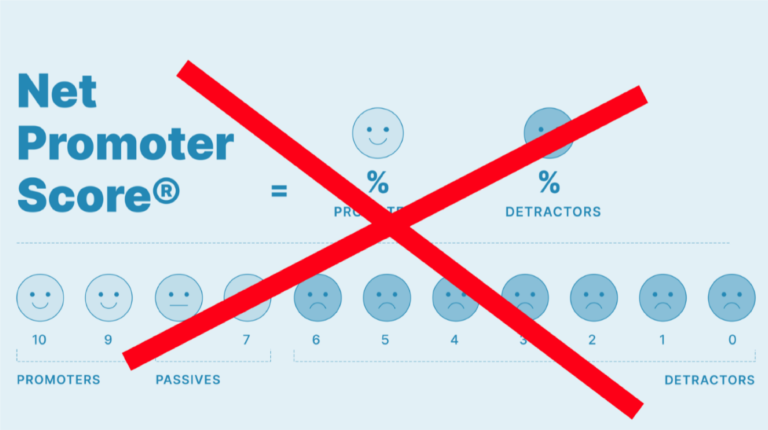Introduction
Touted as “the ultimate question,” Net Promoter Score (NPS) has become a staple metric in healthcare. Healthcare organizations have adopted it to evaluate patient experiences and benchmark service quality.
However, peer reviewed research debunks this fad.
A systematic review article published in Health Expectations reveals that NPS falls short as a meaningful metric. The review concludes, “NPS may be an appealing option for healthcare organizations as a quick and simple measurement… [but] this data does not necessarily translate to healthcare improvement.”

Study
The systematic review analyzed 12 studies on NPS usage in healthcare settings:
- Sample and Sample Size: The 12 studies represented data from more than 65,000 patients from hospitals, general practices, and dental clinics in countries like the UK, Netherlands, India, and Kenya.
- Main Measures:
- Net Promoter Score (NPS): Scores were based on the single question, “How likely are you to recommend this service?”
- Patient Comments: Free-text responses accompanying the score were also analyzed.
- Type of Analysis: The systematic review evaluated the insights these organizations obtained from the NPS scores, patient feedback, and correlation with safety, quality, and improvement outcomes.
What the Study Showed
The authors concluded: “NPS is increasingly being implemented to evaluate patient experience, despite a lack of peer‐reviewed research to support its use in the healthcare setting.” Specifically, they concluded that “Research does not support the use of NPS for widespread Benchmarking…while NPS is often promoted as ‘the ultimate question,’ research suggests it may be insufficient as a stand-alone metric.”
As summarized in the table below, the findings exposed critical weaknesses of NPS:

Key Findings:
- NPS provided no to low actionable insights for quality improvement, strategy planning and decision making.
- Free-text responses identified some specific areas of concern, but neither their validity nor reliability could be ascertained.
- Cultural and demographic factors significantly influenced scores, complicating their interpretation.
Actionable Insights
For healthcare leaders, these findings highlight the pitfalls of relying on NPS:
- Not an appropriate metric to measure patient experience: NPS should not be used to measure patient experience due to its many weaknesses.
- Lack of comparability limits its use in strategy planning: NPS should not be used in strategy planning because of its lack of comparability across different subunits (e.g., clinics or hospitals). It may be replaced or supplemented with more theoretically rigorous and comprehensive metrics to capture the richness and complexity of patient experience.
- NPS comments: NPS may provide some insights about reactive, short-term actions but they are beset with confirmation bias, salience, and lack of generalizability.
Conclusion: Healthcare executives must reassess their blind reliance on NPS as it fails to provide the depth required for meaningful improvements in patient care.
Citation
Adams, C., Walpola, R., Schembri, A. M., & Harrison, R. (2022), “The ultimate question? Evaluating the use of Net Promoter Score in healthcare: A systematic review,” Health Expectations, 25(5), 2328–2339. https://doi.org/10.1111/hex.13577.
